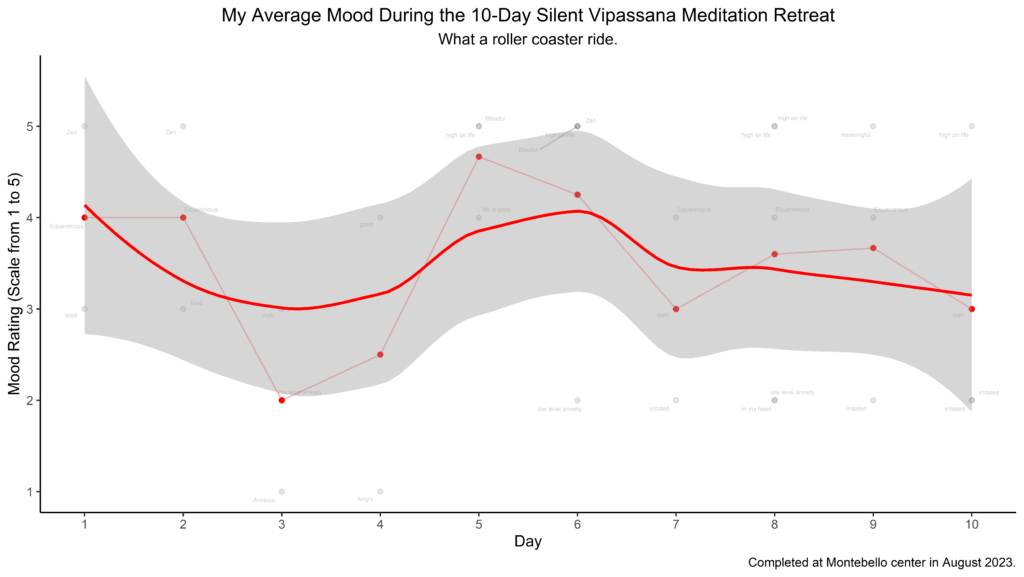What is a Cult?

People mean different things when they use the word cult. Some refer to cults neutrally as a “system of religious veneration and devotion directed toward a particular figure or object.” (Oxford) Others save the pejorative word “for a relatively small group which is typically led by a charismatic and self-appointed leader, who tightly controls its members, requiring unwavering devotion to a set of beliefs and practices which are considered deviant.” (Wikipedia) This article will focus on Wikipedia’s definition.
My Experience
I attended my second ten-day Vipassana silent retreat in Montebello in the summer of 2023; four years after attending my first one. In 2019, I went in with a radically open mind and was swept by Goenka’s charisma. My mind was so open that my brain temporarily fell out. I thought Vipassana meditation was the only technique that could help people. Many of the other attendants felt the same way.
I was effortlessly more skeptical of the technique and claims made my second time around. I think the reason for this was twofold. First, I wasn’t under the first-timer spell. Second, I had spent the last three years completing my Master’s in statistics and reading many science books.

As seen in the picture above, although volatile, my experience was mostly positive. I’m glad I went back and will likely attend again in the future. That said, I couldn’t shake the culty and dogmatic vibes the second time I attended. I felt the need to write this article to organize my thoughts and inform others.
Dogmatic Beliefs
Here’s a non-exhaustive list of dogmatic beliefs shared during the Goenka discourses:
- Complete enlightenment is possible. Zero craving or aversion. Zero suffering.
- Buddha’s eightfold path is the way out of suffering.
- Eating meat is amoral.
- Vipassana meditation is the most effective technique. Other visualization, mantra, or breathing techniques have their problems.
- Eradicating craving and aversion is useful.
- It’s possible to overwrite the valence aspect of perception and experience the world as value-free.
- The building blocks of matter are subatomic particles called Kalapas. Each such particle consists of the four elements (earth, water, fire, air), each with its phenomenological features.
- It’s possible to investigate the laws of nature through the awareness of our sensations.
- The mind holds sankharas. These sankharas evaporate if one can remain equanimous.
- A belief in the afterlife and reincarnation.
- The many miracle stories of Gautama the Buddha.
- A person’s vibrations permeate their environment. A Vipassana meditation room is filled with good vibrations.
The Cult Scale
I rated my Vipassana experiences on the common characteristics of harmful cults. I based the 15 items on my cult rabbit hole (see the resources below) and this conversation with ChatGPT.
| Item | Trait | No | Somewhat | Yes |
| 1 | Centred around a charismatic leader | ✅ | ||
| 2 | The leader has divine qualities with a special mission to save society | ✅ | ||
| 3 | Geared around making money | ✅ | ||
| 4 | Budget allocation is opaque | ✅ | ||
| 5 | Has a sexual component that benefits the leaders | ✅ | ||
| 6 | Has dogmatic beliefs | ✅ | ||
| 7 | They reject other practices | ✅ | ||
| 8 | Aggressive expansion and recruitment schemes | ✅ | ||
| 9 | Expect extreme sacrifices from its members | ✅ | ||
| 10 | Employs psychological manipulation techniques | ✅ | ||
| 11 | Polarized us versus them which causes conflict with society | ✅ | ||
| 12 | Critical of rational independent thought | ✅ | ||
| 13 | New members are showered with love and special attention | ✅ | ||
| 14 | Geographically and informationally insulated from society | ✅ | ||
| 15 | People who want what’s best for you think this group is harmful | ✅ |
To act as a control group, this is how I would rate the average competitive hockey team I played on.
| Item | Trait | No | Somewhat | Yes |
| 1 | Centred around a charismatic leader | ✅ | ||
| 2 | The leader has divine qualities with a special mission to save society | ✅ | ||
| 3 | Geared around making money | ✅ | ||
| 4 | Budget allocation is opaque | ✅ | ||
| 5 | Has a sexual component that benefits the leaders | ✅ | ||
| 6 | Has dogmatic beliefs | ✅ | ||
| 7 | They reject other practices | ✅ | ||
| 8 | Aggressive expansion and recruitment schemes | ✅ | ||
| 9 | Expect extreme sacrifices from its members | ✅ | ||
| 10 | Employs psychological manipulation techniques | ✅ | ||
| 11 | Polarized us versus them which causes conflict with society | ✅ | ||
| 12 | Critical of rational independent thought | ✅ | ||
| 13 | New members are showered with love and special attention | ✅ | ||
| 14 | Geographically and informationally insulated from society | ✅ | ||
| 15 | People who want what’s best for you think this group is harmful | ✅ |
It’s safe to say that Vipassana is far from being a dangerous cult. At least in my experience and those I spoke with. Most people, including myself and Yuval Noah Harari, praise the benefits of regular meditation retreats. Of course, every hard-core spiritual practice selects certain types of individuals. Typically, vulnerable souls in search of redemption with high openness to experience.
The Value of Cults
I would even go as far as to argue that some degree of cultishness might be optimal to incentivize people to meditate and stick with a difficult practice. We are emotional beings. Cult psychology has engineered the perfect storm to motivate groups of people to behave in irrational ways.
We can all benefit from rational dogma; from unquestioned beliefs to avoid paralysis by analysis. One personal example is that I chose to believe that human beings have some form of free will (I’m a compatibalist). It’s a useful dogma and its potential harm can be mitigated by compassion.
We can’t simply get rid of all cults. We need some healthier forms of blind devotion. You can listen to the atheist philosopher Daniel C. Dennett on the topic.
Opportunity Cost & Verdict
The Vipassana technique demands extreme commitment from its practitioners. One hour of meditation in the morning, another in the evening, and a yearly ten-day silent retreat are the minimum requirements to maintain the practice. If applicable, you’re also expected to meet once per week with fellow students to meditate for an hour.
Trying to squeeze in two hours of meditation daily is quite a challenge, especially for a parent juggling a full-time job. And let’s not even talk about taking two weeks of vacation for solo silent retreats while leaving your family behind.
It’s here that I believe the practice has the highest risk. There are other big rocks that fill our finite jar. A blind devotion to the practice has to come at the cost of other things. Tradeoffs are inevitable.
Give me six hours to chop down a tree and I will spend the first four sharpening the axe.
Abraham Lincoln
Goenka would argue that the time spent in meditation is time spent sharpening the axe. I agree with this from personal experience. However, is two hours the minimum effective dose? Are the benefits are the practice studied and quantified? Are there other techniques that provide most of the benefits while better fitting your current life circumstances and values? Above is my main criticism of the practice. An over-prioritization of the practice for the wrong person will impede on social relationships and other important domains of life.
The specific claims about reincarnation and quantum physics don’t bother too much. As Goenka said, it’s nonsensical to reject a sweet dish because there’s a little cardamom that you don’t like or because it’s not served in your favourite container. You’re much better off taking out the rock and enjoying the rest.
Read This Next
- My 10-day Vipassana Silent Retreat Experience
- What I Learned from Tracking my Mood for 1000 Days
- Life Score: A Subjectively Objective Way to Evaluate your Life
- The Happiness Hypothesis – Book Notes
- The Do-Nothing Morning Routine Experiment
- Four Thousand Weeks – Book Notes
- How To Understand Emotions – Lisa Feldman Barrett
- How Emotions Are Made – Book Notes
- The Molecule of More – Book Notes
- The Philosophy Of Religion
Other resources
- Wikipedia page
- Goenka Vipassana Discourses on YouTube
- Discourse Summaries
- Netflix Explained: Cults
- Netflix Explained: Brainwashing
- Waco
- Raël: The Alien Prophet
- Roch Thériault
